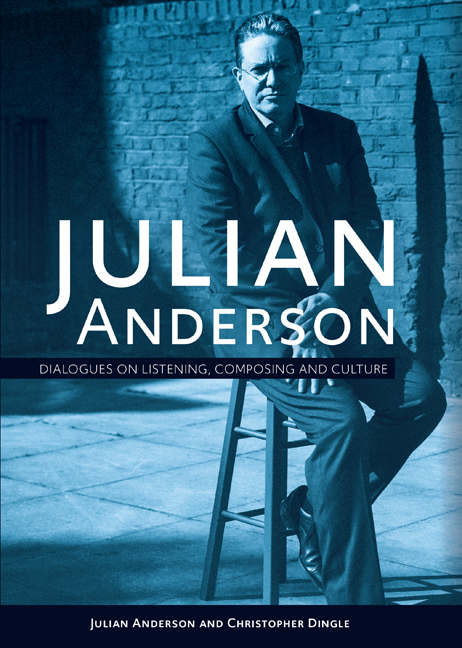Book contents
- Frontmatter
- Contents
- List of Illustrations
- Foreword
- Acknowledgements
- Introduction
- Prelude – Jeux: A Conversation Over Lunch
- Conversation One Origins
- Conversation Two Enthusiasms
- Conversation Three Training
- Conversation Four Dance
- Conversation Five Folk
- Conversation Six Composing (or Not)
- Conversation Seven Understandings
- Conversation Eight Beginnings (and Endings)
- Conversation Nine Puzzles
- Conversation Ten Singing
- Conversation Eleven Olly
- Conversation Twelve Memory
- Conversation Thirteen Opera
- Conversation Fourteen Practices
- Conversation Fifteen Outsiders?
- Conversation Sixteen Quartets
- Conversation Seventeen Advocacy
- Conversation Eighteen Partnerships
- Coda: Multiple Choices
- Chronology
- List of Personae
- Glossary of Musical Terms
- Macrotonality
- Catalogue of Published Works by Julian Anderson
- List of Recordings of Julian Anderson’s Music
- Bibliography
- Discography
- Index
Conversation Sixteen - Quartets
Published online by Cambridge University Press: 16 September 2020
- Frontmatter
- Contents
- List of Illustrations
- Foreword
- Acknowledgements
- Introduction
- Prelude – Jeux: A Conversation Over Lunch
- Conversation One Origins
- Conversation Two Enthusiasms
- Conversation Three Training
- Conversation Four Dance
- Conversation Five Folk
- Conversation Six Composing (or Not)
- Conversation Seven Understandings
- Conversation Eight Beginnings (and Endings)
- Conversation Nine Puzzles
- Conversation Ten Singing
- Conversation Eleven Olly
- Conversation Twelve Memory
- Conversation Thirteen Opera
- Conversation Fourteen Practices
- Conversation Fifteen Outsiders?
- Conversation Sixteen Quartets
- Conversation Seventeen Advocacy
- Conversation Eighteen Partnerships
- Coda: Multiple Choices
- Chronology
- List of Personae
- Glossary of Musical Terms
- Macrotonality
- Catalogue of Published Works by Julian Anderson
- List of Recordings of Julian Anderson’s Music
- Bibliography
- Discography
- Index
Summary
Even a few years ago, nobody would have associated Anderson with the string quartet. With the youthful Light Music finally being performed in 2013 and two further string quartets under his belt, the genre is now a firm part of his catalogue. This conversation provides a detailed look at the Second and Third Quartets and, reflecting the nature of the genre, some of what follows gets quite technical, though there is also much that isn’t. It starts with Anderson's treatment of his source material in the Second Quartet, before moving on to the treatment of pitch and rhythm, and the way the genre puts a lens on technique. The Third Quartet prompts reflection on how pieces open, before giving specific observations on each movement. Among myriad other things, Anderson reveals the harmonic framework of the Quartet, enthuses about an important new harmony for his music and explains how the extraordinary conclusion to the work is created.
CD: Having spent several years on Thebans, which was your largest work in every respect, you turned immediately to the intimacy of writing a string quartet, a medium you hadn't touched since your teenage years. Why did you make that move?
JA: I was going from 40 staves per page to four, which was enormous fun. My first quartet, Light Music, had been premiered finally in 2013, at the Aldeburgh Festival by the Arditti. Because of that, I really felt the string quartet, as a medium, had suddenly begun to unfreeze for me, psychologically. As soon as I heard the Arditti rehearsing Light Music, I knew what I wanted to write. The project of working with the large collections of Renaissance German Christmas carols, Weihnachtslieder, went back a long time. I didn't know it would be a quartet, I just wanted to do something with all this. Some of them are still sung as carols here. ‘Wie schön leuchtet der Morgenstern’, ‘In dulci jubilo’ and things like that are well known in Britain and America, everywhere. I came across many others that are equally lovely. I studied a lot of them and made a big pitch reservoir from them. I wanted to do a piece that would explore some kind of intonation issues. Having heard that the First Quartet did actually work, I thought it was time to follow some of that up.
- Type
- Chapter
- Information
- Julian AndersonDialogues on Listening, Composing and Culture, pp. 316 - 339Publisher: Boydell & BrewerPrint publication year: 2020

